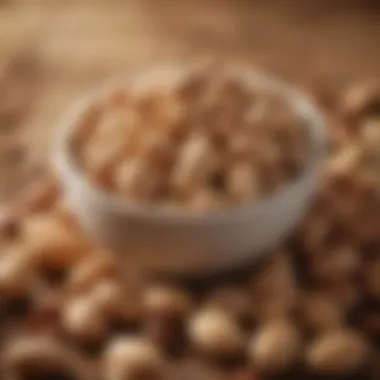Pine Nuts: A Nutritious Addition to Your Keto Diet


Intro
The ketogenic diet has captured the attention of many food enthusiasts and health-conscious individuals. Centered around reducing carbohydrate intake and increasing healthy fats, this dietary approach aims to push the body into ketosis, where fat becomes the primary fuel source. With a plethora of options available, it's vital to explore specific ingredients that not only align with keto principles but also elevate the culinary experience. One such ingredient is the humble pine nut.
In the world of gourmet cooking, pine nuts are often celebrated for their rich, buttery flavor and subtle sweetness. They can transform a mundane dish into something extraordinary while fitting seamlessly into a keto framework due to their favorable macronutrient profile. This discussion will delve into the role of pine nuts in a keto diet, examining their nutritional benefits, culinary versatility, and health implications, effectively guiding food lovers in incorporating this delightful nut into their repertoire.
Preface to Pine Nuts and the Keto Diet
When diving into the world of ketogenic diets, there's often a focus on the star players like avocados, olive oil, and fatty fish. However, overlooked in this culinary journey are pine nuts, tiny nuggets of flavor and nutrition that can significantly contribute to a keto regimen. This section underscores why understanding the role of pine nuts is crucial for anyone keen on enhancing their diet with rich nutrition while still adhering to keto principles.
Defining Keto
The ketogenic diet isn’t just a passing fad; it’s a method of eating that flips the body’s normal energy source on its head. Typically, our bodies burn carbohydrates for fuel. However, in a ketogenic diet, the aim is to drastically reduce carbs to encourage the body to enter a state called ketosis. In ketosis, the body turns to fat for energy, burning through its stores more efficiently.
But it’s not just about cutting carbs—it's about the balance of macronutrients. Usually, a keto diet consists of roughly 70-75% fats, 20-25% protein, and only about 5-10% carbohydrates. This is where pine nuts can shine, being packed with healthy fats while keeping the carbohydrate content low.
What are Pine Nuts?
Pine nuts, or pine seeds, come from pine cone-producing trees. They’re not the kind of nuts that you might see in the typical grocery aisle; rather, they are seeds encased in a hard shell. These little beauties have a slightly sweet, buttery flavor and a soft, meaty texture, making them versatile in various dishes.
Nutty Flavor with Nutritional Value:
- Rich in monounsaturated fats, these nuts provide a heart-healthy boost,
- Include magnesium, which supports energy production and muscle function,
- Possess vitamin E, which is known for its antioxidant qualities.
While you can enjoy them raw, a quick toast in a skillet elevates their flavor profile, unlocking rich nutty aromas that can enhance many recipes. However, it's important to note that given their higher fat content, portion control is essential on a keto diet to maintain that fine balance in macronutrients.
"Incorporating pine nuts can not only boost flavor but also enrich overall nutrition in a keto meal plan."
These simple seeds can appear mundane, yet they hold the potential to transform your dishes, turning the ordinary into the extraordinary while adhering to the principles of a ketogenic lifestyle. Understanding what pine nuts are, how they can fit into dietary needs, and their benefits sets the stage for their thoughtful inclusion in your meal plans.
Nutritional Composition of Pine Nuts
Understanding the nutritional composition of pine nuts is crucial for those following a keto diet. These tiny seeds pack a sizeable punch in terms of their health benefits. Not only are they nutrient-rich, but their unique profile aligns well with the requirements of a ketogenic lifestyle. In this section, we will dissect the macronutrients and micronutrients found in pine nuts, allowing readers to make informed dietary choices.
Macronutrients Overview
Pine nuts hold an intriguing balance of fats, carbohydrates, and protein. Let’s break it down:
- Fats: Pine nuts are primarily composed of fats—about 68% of their total caloric content comes from healthy fats. This is music to a keto dieter’s ears, as increasing good fats is essential in such a low-carb regimen. The fat profile features both monounsaturated and polyunsaturated fats, which are known to support heart health.
- Carbohydrates: At first glance, one might raise an eyebrow at the carb content, which stands at around 13% per serving. However, most of these carbs are fiber, meaning they have a minimal impact on blood sugar levels, a significant consideration for anyone on a ketogenic journey.
- Protein: Pine nuts also offer around 14% protein content. This can help in maintaining muscle mass while feeling full and satisfied. Plus, they are an excellent option for those who are vegetarians but still want to adhere to high-protein diets.
In summary, the macronutrient profile of pine nuts is well-suited for a keto diet, combining fats, protein, and fiber in a way that promotes satiety and overall health.
Vitamins and Minerals


Beyond macronutrients, pine nuts are abundant in vitamins and minerals that bring additional health benefits:
- Vitamin K: Important for blood clotting and maintaining bone health.
- Magnesium: Plays a role in over 300 biochemical reactions in the body, including muscle function and cardiovascular health.
- Zinc: Supports the immune system and promotes wound healing.
- Iron: Essential for transporting oxygen in the blood.
- Copper: Vital for iron metabolism and the formation of red blood cells.
"Pine nuts are like little treasure chests, holding not only good fats but also an array of essential vitamins and minerals."
These minerals and vitamins enhance their contribution to overall health, making pine nuts an excellent addition to a keto diet. It’s not just about macros; the micronutrient density also plays a significant role in boosting health and well-being. Incorporating them into meals can ensure that dieters don't miss out on vital nutrients while savoring delicious flavors.
Keto Compatibility of Pine Nuts
When it comes to incorporating pine nuts into a keto diet, understanding their compatibility is paramount. The ketogenic lifestyle, often characterized by its focus on high fats and minimal carbohydrates, thrives on nutrient-dense foods. Pine nuts, with their heavenly taste and impressive nutrient profile, can stand out as a valuable addition in this context. However, being thoughtful about their consumption is vital to maximizing their benefits while aligning them with keto principles.
Healthy Fats and Low Carbs
Pine nuts have a delectable richness that reflects their high-fat content. Unlike many nuts that offer an abundance of omega-6 fatty acids, pine nuts provide a more balanced blend, emphasizing monounsaturated fats. This can be advantageous, as monounsaturated fats are generally considered supportive of heart health. Furthermore, per ounce, the carb content is well under the recommended limit for most keto dieters. Typically, a serving contains around 4 grams of carbs, with about 1 gram of fiber, which means the net carbs are comparatively low.
This is not just number crunching; the healthy fat profile contributes significantly to making one feel satiated. Many dieters find satisfaction with smaller portions because of these vast energy sources, which can lead to less snacking on carb-heavy foods. So, one might say that pine nuts are not just another ingredient—they play a role in reinforcing the very foundation of a keto lifestyle.
Portion Control and Serving Sizes
Now, let’s talk about portion control. Just like a sculptor chiseling away at a piece of marble, how you measure out these little gems changes the entire picture. Pine nuts may be low in carbs and high in beneficial fats, but they still pack a caloric punch. Just a handful can add around 200 calories to your daily intake.
Here are some practical tips for managing portion sizes with pine nuts:
- Stick to a standard serving size of about 1 ounce (roughly 28 grams), which equates to about 150-200 calories.
- Consider incorporating pine nuts into dishes to enhance flavor, rather than eating them alone. For instance, tossing a tablespoon of pine nuts into a salad or mixing it in a pesto brings their essence without overindulging.
- Monitor how they fit into your overall macronutrient targets for the day. Balancing with other low-carb foods ensures you’re not swerving off the keto path.
In summary, while it’s easy to indulge in pine nuts due to their unique flavors and health benefits, a mindful approach to serving sizes can enhance their role in the keto journey without derailing your nutritional goals.
Culinary Uses of Pine Nuts
Pine nuts are not just an afterthought sprinkled on top of dishes; they carry their own weight in the culinary world. Their distinct, buttery flavor and creamy texture make them a coveted ingredient in various cuisines. In the context of a keto diet, incorporating pine nuts can add nutritional value while enhancing the sensory experience of meals. They offer opportunities for creativity in the kitchen, allowing food lovers to experiment with different recipes and flavor combinations.
Incorporating Pine Nuts in Recipes
When it comes to incorporating pine nuts in recipes, versatility reigns supreme. These little gems are suitable for both savory and sweet dishes, making them an invaluable addition to any repertoire.
- Pestos and Sauces: Pine nuts are famously used in pesto, but don't stop there. Try blending them into creamy sauces or salad dressings. The oiliness of pine nuts can replace some heavier fats while maintaining that luscious mouthfeel.
- Baking and Snacks: You can toss pine nuts into bread or muffin mixes. They hold their own when roasted, making them a great snack by themselves or as part of a nut mix. Just be mindful of portion sizes—as good as they are, they can turn those macros upside down if you overdo it.
- Toppings: Consider using pine nuts as a topping on roasted vegetables or grilled fish. Their subtle crunch intertwines beautifully with the other textures on the plate. Likewise, they can elevate a simple salad, providing both aesthetics and taste.
- "Pine nuts bring a unique texture and flavor that can transform even the simplest dish into something extraordinary."
Flavor Pairings with Other Ingredients
Pine nuts have a unique ability to complement a variety of flavors, lending themselves effectively to both hearty and light dishes. As a keto dieter, knowing what they pair well with can expand your culinary horizons. Here are some key pairings:


- Cheeses: The creamy notes of goat cheese or ricotta blend seamlessly with the nutty essence of pine nuts. Together, they create a rich flavor profile that can enhance salads or pasta dishes.
- Herbs: Fresh basil, parsley, and dill are excellent companions for pine nuts. These herbs elevate the nutty flavor and make dishes feel fresh and vibrant.
- Vegetables: Roasted Brussels sprouts, asparagus, or zucchini can benefit from the addition of pine nuts, offering a pleasing contrast in texture and taste. The earthiness of roasted vegetables plays well with the creamy undertones of the nuts.
- Fruits: Pairing pine nuts with fruits like figs or pears can create a delightful contrast between sweet and savory, a hallmark of gourmet dishes. Adding a sprinkle to a fruit salad can surprise the palate in the best way possible.
By understanding these culinary uses and flavor pairings, it's clear that pine nuts are more than just a keto-friendly food; they are a cooking ally that can elevate home cooking to new heights.
Health Benefits of Pine Nuts
Pine nuts are not just a delightful addition to a range of dishes; they pack a nutritional punch that offers numerous health benefits. For those following a keto diet, understanding these benefits can help inform choices that not only support weight loss but also enhance overall health. The presence of beneficial compounds like vitamins, minerals, and antioxidants in pine nuts contributes significantly to their value as a food source. Here, we delve into specific health aspects that make pine nuts a worthy consideration.
Antioxidant Properties
Pine nuts are a rich source of antioxidants, which play a crucial role in neutralizing harmful free radicals in the body. Free radicals are byproducts of cellular metabolism and external factors such as pollution and UV exposure. When their levels peak, they can lead to oxidative stress, a condition implicated in various chronic diseases like cancer and cardiovascular issues. Pine nuts contain several antioxidant compounds, including vitamin E and polyphenols, that help in combating this stress.
- Vitamin E: This vitamin is noted for its ability to protect cell membranes and boost immune function. It's like having an army of tiny soldiers protecting your cells from damage.
- Polyphenols: These naturally occurring compounds have been studied for their role in reducing inflammation and promoting heart health. Insider tip: enjoy them in salads or sauces to maximize their protective benefits.
Incorporating pine nuts into your diet can greatly enhance your intake of antioxidants, which is a crucial aspect of maintaining health on a keto regimen.
Supporting Heart Health
The heart health benefits of pine nuts are noteworthy. They are high in monounsaturated fats, which are considered heart-healthy fats. These fats can help to lower levels of bad cholesterol (LDL) while increasing good cholesterol (HDL), improving your overall lipid profile. Studies have shown that a diet rich in monounsaturated fats can reduce the risk of heart disease and promote cardiovascular health.
Furthermore, the magnesium content in pine nuts plays an essential role in regulating blood pressure. Magnesium helps to relax blood vessels, which can mitigate hypertension – a key factor in maintaining heart health.
Consider this breakdown:
- Monounsaturated Fats: Support cholesterol levels
- Magnesium: Aids in blood pressure regulation
Adding a sprinkle of pine nuts to your meals can be a tasty way of making heart-smart choices.
Impact on Satiety and Weight Management
One of the challenges often faced in the keto diet is combating hunger while trying to keep carbs low. Pine nuts come to the rescue again. Their rich fat content not only provides sustained energy but also helps in promoting satiety – that feeling of fullness that keeps you from reaching for unhealthy snacks. Their creamy texture and rich flavor make them a satisfying choice when incorporated in meals.
- Healthy Fats: The fiber found in pine nuts also aids in digestion, helping you feel full for extended periods.
- Protein Content: With a good dose of protein, they support muscle maintenance, especially important for those on a ketogenic diet.
A handful of pine nuts can curb cravings, making meal times more satisfying. It’s like having a little secret trick in your pocket for maintaining your keto lifestyle.
Considerations for Including Pine Nuts in a Keto Diet
When it comes to embracing a ketogenic lifestyle, incorporating the right ingredients can make or break your dietary journey. Pine nuts present themselves as a delightful option. However, there are crucial considerations that one should think about before fully adding these nutty gems into your meal plan. They’ve got the potential to enrich flavors and boost nutrition, but understanding some key elements can lead to a more mindful and enjoyable experience with this unique nut.
Potential Allergies and Intolerances
Like any food, pine nuts aren’t universally welcomed by all. Some individuals may have allergies that can lead to unwanted reactions, sparking symptoms like itching, swelling, or even serious anaphylaxis. Those with a known nut allergy may want to approach these with caution. It’s worthwhile to consult with a healthcare provider if you have uncertainties regarding food allergies. Additionally, a small subset of people experience “pine mouth,” a condition where the taste buds react oddly after consuming pine nuts, leading to a metallic aftertaste for days.
It’s advisable to start with a small serving if you’re trying pine nuts for the first time, paying close attention to any reactions your body may have. This cautious approach not only keeps you safe but also helps in building awareness about your body’s acceptance of new foods.


Cost and Sustainability Issues
The final decision of whether or not to include pine nuts in your keto diet may also hinge on practical factors like cost and sustainability. Compared to other nuts, pine nuts can be quite pricey, primarily due to the labor-intensive harvesting process. It often requires skilled workers to scale trees and extract the seeds, making them a luxury item in many parts of the world.
Moreover, not all pine nuts are sourced sustainably. Depending on the region and the species, overharvesting can lead to declining populations and ecosystem imbalances. Whenever possible, choose products that specifically state their sustainable sourcing practices. This simple step can positively impact both your health and the environment.
Alternatives to Pine Nuts
Incorporating pine nuts into a keto diet can be rewarding, but they are not the only player in the nut and seed game. The consideration of alternatives is essential, especially for those who may have allergies, dietary restrictions, or just want to mix things up. Understanding these substitutes can not only enhance your meals but also ensure that you remain aligned with the principles of a keto lifestyle.
Seeds and Other Nuts
When looking for alternatives to pine nuts, various seeds and nuts can step in to fill the void. Here’s a closer look at some notable options:
- Sunflower seeds: These seeds pack a punch when it comes to healthy fats, and they have a delightful crunch. They contain very few carbs and are generally budget-friendly.
- Pumpkin seeds: Also known as pepitas, pumpkin seeds are rich in zinc and magnesium, adding nutritional value. They can be roasted and added to salads for an extra crunch.
- Almonds: These are well-loved in the keto community. Their slightly sweet flavor complements both savory and sweet dishes.
- Brazil nuts: This option is loaded with selenium, beneficial for your thyroid health, and has a unique earthy flavor that makes them stand out in trail mixes.
- Pecans: Low in carbs and high in healthy fats, pecans have a buttery taste and can be used finely chopped in desserts or as a topping for various dishes.
When you make a switch, it's crucial to keep in mind the different flavor profiles and how they might alter your dish. Many of these alternatives have their own unique benefits and can be toasted or spiced to amplify their flavor.
Cultural Variations in Nut Usage
Various cultures have their own favorites when it comes to incorporating nuts into diet. It’s interesting how something as simple as a nut can carry different traditional significance depending on the culture. For example:
- Middle Eastern cuisine often uses pine nuts, walnuts, and pistachios in dishes ranging from pilafs to savory pastries.
- Southeast Asian dishes might utilize peanuts or cashews in curries, adding creaminess and depth of flavor that complement spices beautifully.
- In European countries, chestnuts have a richer history, often featured in festive dishes and desserts.
Exploring these cultural variations not only broadens your culinary skills but allows you to appreciate the versatility of nuts. Incorporating these alternatives into a keto diet is like opening a door to a world of flavors that can keep meals fresh and exciting.
"Cooking is an art, and using different types of nuts adds a twist that can transform seemingly mundane dishes into masterpieces."
This party of flavors ensures that you remain satisfied on your keto journey, while also allowing for creativity and exploration in your meals. Thus, the journey does not end with pine nuts; it only begins with the myriad of options available.
Ending: The Role of Pine Nuts in the Keto Journey
Pine nuts play a distinct part in the keto narrative, graceing the table with their rich flavor and valuable nutrients. In the world of keto, where every ingredient is meticulously selected for its compatibility with low-carb, high-fat principles, pine nuts fit the bill quite nicely. They offer a delightful source of healthy fats and are also a tasty addition to various dishes. Their culinary versatility, combined with impressive nutritional properties, makes them a worthy contender in a well-rounded keto diet.
When considering the impact of pine nuts on overall health, we see that these tiny seeds hold a wealth of antioxidants. This means they not only satisfy hunger pangs but may also support heart health and contribute favorably to weight management. Being mindful of portion sizes plays a crucial role here; too many can tip the balance away from keto goals, yet the right amount brings benefits to the table. These elements emphasize the importance of mindful consumption of pine nuts, ensuring one treasures their nutrition without overindulgence.
"Pine nuts are not just a rich source of energy; their unique flavor profile can elevate a simple dish into a gourmet experience."
Final Thoughts on Nutrition and Flavors
Pine nuts are an exceptional ingredient when it comes to enriching both taste and nutrition in the keto diet. With a moderate carb content and a delightful crunch, they harmonize beautifully with various foods, be it a simple salad or a sophisticated pesto. Their creamy texture and subtle sweetness enable them to blend seamlessly into dishes, making them a favorite for many keto enthusiasts. Incorporating them can yield a delightful surprise, leading to a more satisfying meal.
However, it's crucial to remember that while they carry health benefits, moderation is key. Even in their healthy state, excess can steer one off the keto path. Dialing down the quantity while still reaping the rewards enhances both one's diet and the overall experience of eating.
Encouragement for Culinary Exploration
Exploring the world of pine nuts can be likened to entering a treasure trove of flavors and nutrition. Whether you're tossing them into your morning omelet or blending them into a creamy sauce, their potential is vast. Cooking with pine nuts invites a bit of creativity. Why not try using them in desserts or as a topping for roasted veggies? The applications are nearly endless and can be tailored to personal preference.
In the grand tapestry of the culinary world, one can discover new, innovative ways to introduce these nuts into everyday meals. Pairing them with herbs and spices, or even cheese, can elevate simple dishes into noteworthy creations. The journey of incorporating pine nuts into a keto lifestyle encourages exploration and experimentation.
By embracing such adventures in cooking, one not only adheres to keto principles but also cultivates a true joy of food—an important aspect that should never be overlooked in any dietary regimen. So dive in and enjoy the nutty marvels that pine nuts have to offer!



